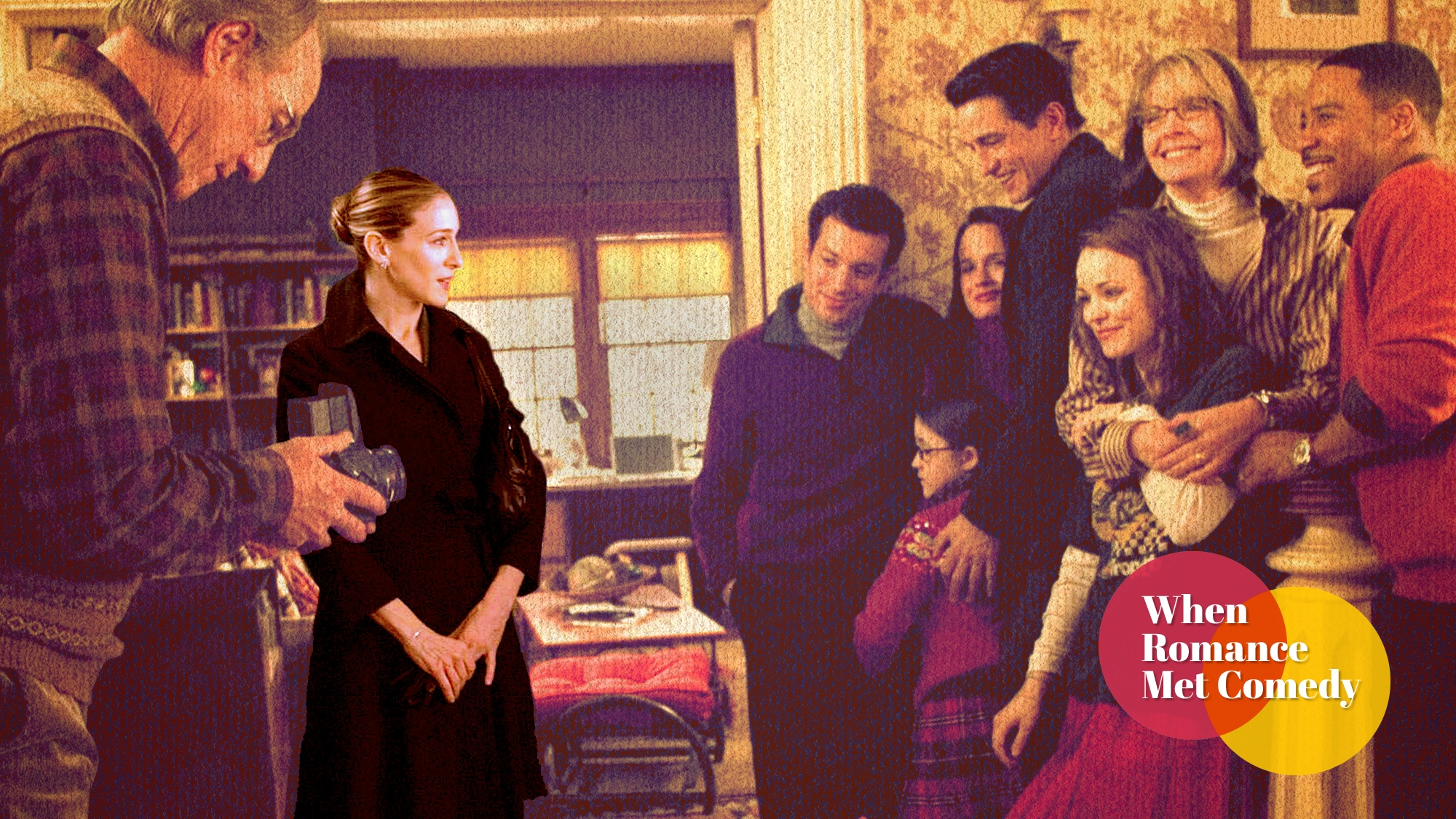On falling in love with The Family Stone
This Christmas, give the divisive 2005 romantic comedy a second chance
Image: Graphic: Libby McGuire
If I’ve come up with a grand thesis over the past four years of writing about romantic comedies for this column, it’s that I genuinely think people watch rom-coms differently than they watch other movies. They either go in with their hackles raised, ready to mock the plot swerves that exist outside of the realm of realism, or they watch them passively, automatically assuming there’s little meat on their bones. And while experiencing a romantic comedy in either of these ways can be perfectly enjoyable, doing so often means missing out on the details and intentions that fuel the genre at its best. I should know, because I’m guilty of doing just that to The Family Stone.
The second most divisive Christmas romance after Love Actually, The Family Stone earned mixed reviews on its release but enjoyed a solid box office showing and has only grown in esteem over the past 16 years. Many now consider it part of the contemporary Christmas canon. And while past viewings of The Family Stone never really did it for me, the film sprang to life when I rewatched it more closely for this column. This time around, I came to appreciate the intentionally thorny things it’s attempting to explore, as well as the Christmas magic it purposefully (if only semi-successfully) deploys with its sister-swapping love stories. I get why The Family Stone is something of an acquired taste, but I also think it’s one worth acquiring.
At its heart, The Family Stone is a movie about how horrible it is to be judged and how fun it can be to do the judging. Uptight Manhattan careerist Meredith Morton (Sarah Jessica Parker) really does try her best to make nice with the family of her boyfriend, Everett Stone (Dermot Mulroney). But she’s reserved, meticulous, and socially awkward in a way that’s naturally off-putting. The Family Stone can be uncomfortable viewing because big chunks of it just ask you to watch Meredith be very, very bad at things: small talk, charades, backing down from an argument when she’s clearly in the wrong. For all her outward elegance, Meredith is completely lacking in social grace. And if there’s one thing the loosely bohemian, casually intellectual Stone family hates, it’s stuffy formality.
The Stones, meanwhile, are the sort of cliquey clan that’s terrifying from the outside but wonderful to be a part of. What immediately jumps out is how physically affectionate they are with one another. There’s this moment where they’re catching up around the kitchen table and laid-back older brother Ben (Luke Wilson) casually pulls his younger brother Thad (Tyrone Giordano) onto his lap. It’s a pitch-perfect depiction of loving adult siblinghood, and the sort of little touch you rarely see in big studio rom-coms of the 2000s, which often have a clinical quality to their staging. The best thing writer/director Thomas Bezucha brings to The Family Stone is a casual, lived-in quality that carries over from the cozy costuming to the chummy physical blocking to the fantastic production design of the Stone family home.
Chief in both disheveled chic and Stone family judgment is Rachel McAdams as younger sister Amy. It’s the performance that even those who dislike The Family Stone tend to agree is the best thing about the movie. She’s based on Bezucha’s sister, whose own experience bringing home a dud of a boyfriend is what inspired the movie in the first place. Just as Ben has inherited his wonderful sense of warmth from Stone family patriarch Kelly (Craig T. Nelson), Amy has clearly inherited her passive aggressive sense of humor from matriarch Sybil (Diane Keaton). A big part of what makes The Family Stone special is that Bezucha seems to have an understanding of the family’s dynamics that stretch far beyond what’s explicitly laid out on the page.
There’s almost a sleight of hand to the way Bezucha is able to give each member of his massive ensemble their only meaningful place in the puzzle. Though it doesn’t serve any narrative purpose, Bezucha takes time for a sweetly melancholy late-night scene where Kelly checks in on his pregnant, peacemaker oldest daughter, Susannah (Elizabeth Reaser), who seems to be juggling more than anyone but him notices. Elsewhere, Ben and his niece (Savannah Stehlin) share a charmingly playful dynamic that mostly just unfolds in the background of big group scenes. Thad’s partner, Patrick (Brian J. White), meanwhile, has the ease of someone fully enmeshed in the Stone clan, but also the empathy of someone who had to go through his own trial-by-fire to get there. Because Thad is deaf and the Stones regularly sign, entering their home is like stepping into a new world where you literally don’t always speak the language.
 Keep scrolling for more great stories.
Keep scrolling for more great stories.
